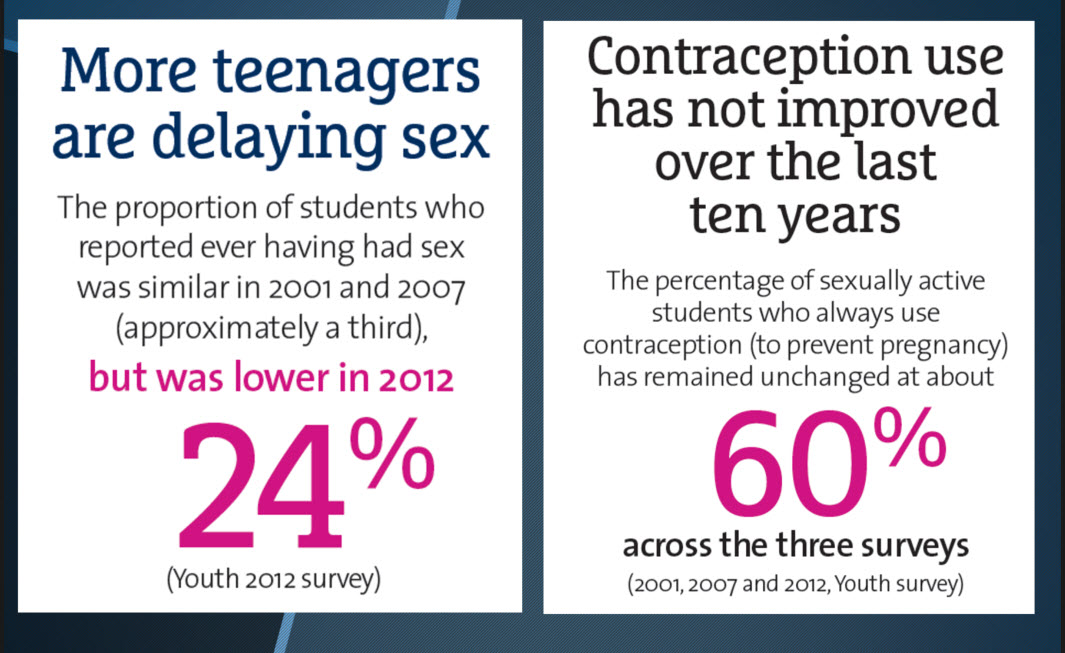Teen birth rate in New Zealand half of 2008 figure
 NZ Herald 16 May 2017
NZ Herald 16 May 2017
Family First Comment: Family Planning say that a drop of 33% down to 24% for sexual involvement is a ‘small drop’! Really? Are they worried that youth are ignoring them and are – shock horror – abstaining??
The teenage birth rate in New Zealand has halved since 2008, according to new figures released today.
Statistics New Zealand data showed the teen birth rate had dropped each year since 2008 when it was 33 births per 1000 women aged 15 to 19. Last year the rate dropped to 16 births per 1000 women in that age group.
In 1962, when birth rates were highest for women in their twenties, the teen birth rate was 54 births per 1000. While rates dropped for women in their twenties throughout the 1960s and 1970s, the teen rate increased to a peak of 69 per 1000 in 1972.
Within the 15-19 age group, birth rates increased with age last year – from 2 per 1000 at age 15 to 35 at age 19. All ages in this group had significantly lower rates in 2016 than in 2008.
Just 4 per cent of the 59,430 births in 2016 were to teen mums, compared with 8 per cent of births in 2008.
Family First NZ has welcomed the drop in New Zealand’s teen birth rate.
National Director of Family First NZ Bob McCoskrie said he believed the drop was because their message to abstain from or postpone sexual involvement was getting through.
“There is also evidence that the drop is because more and more teenagers are delaying sex. According to the Youth 2012 survey undertaken by Auckland University, the proportion of students who reported ever having had sex was similar in 2001 and 2007 (approximately a third) but was lower in 2012 – down to 24 per cent. And less than 19 per cent said they were currently sexually active,” he said.
“Groups like Family Planning will argue that it is because of contraception and the morning-after pill that the teen pregnancy rate has dropped but the evidence refutes that claim. The Youth Survey showed that contraception use had not improved over the last 10 years, and in fact sexually active teens are being riskier with a 7 per cent decrease in the use of condoms between 2007 and 2012.
“And a US study found increased access to emergency contraception increases the rates of sexually transmitted diseases, risk taking and a false sense of security, while doing nothing to reduce the number of abortions. A study in the Journal of Health Economics in January 2011, conducted in the United Kingdom, found that widespread access to emergency contraception did nothing to reduce pregnancy but increased STD rates by 12 per cent.”
Family Planning chief executive Jackie Edmond said young people delaying their first sexual encounter may have been a factor but said the small drop in the number of students who reported having sex in the Youth 2012 survey did not explain the huge decrease in the rate of teen pregnancies.
“It’s probably a mixture of things. There’s no definitive evidence of what it is,” she said when asked why the number of teen pregnancies had dropped.
She said increased access to more reliable contraception like IUDs and other implants was likely to be part of the reason.
“Often it’s human error which is the cause of failure of contraceptives,” she said.
READ MORE: http://www.nzherald.co.nz/nz/news/article.cfm?c_id=1&objectid=11856990







